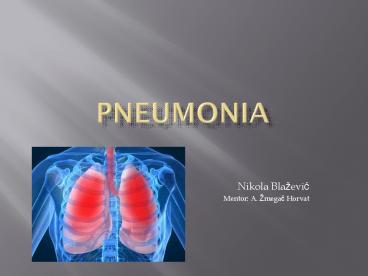PNEUMONIA - PowerPoint PPT Presentation
1 / 13
Title:
PNEUMONIA
Description:
Nikola Bla evi Mentor: A. mega Horvat inflammation of the lungs caused by infection many different causes: bacteria, viruses, fungi, idiopathic damages ALVEOLI ... – PowerPoint PPT presentation
Number of Views:46
Avg rating:3.0/5.0
Title: PNEUMONIA
1
PNEUMONIA
- Nikola Blaževic
- Mentor A. Žmegac Horvat
2
- inflammation of the lungs caused by infection
- many different causes bacteria, viruses,
fungi, idiopathic - damages ALVEOLI gt exudate (fluid) gt consolidates
gt lack of oxygen
3
- NORMAL ALVEOLI ?
- PNEUMONIA ?
4
DIAGNOSIS
- Symptoms (dyspnea, cough)
- Physical examination
- X-ray (not always reliable)
- Blood test (high white cell count gt inflammation)
- Sputum cultures
- CT (most reliable)
5
COMBINED FINDINGS
- Prediction rule for the frequency of
inflammation - Temperature gt 100 degrees F (37.8
degrees C) - Pulse gt 100 beats/min
- Crepitations
- Decreased breath sounds
- Absence of asthma
- Probability of inflammation based on the number
of findings - 5 findings - 84 to 91 probability
- 4 findings - 58 to 85
- 3 findings - 35 to 51
- 2 findings - 14 to 24
- 1 finding - 5 to 9
- 0 findings - 2 to 3
6
Classification
- Early classification schemes
- Anatomical 1. lobar pneumonia(streptoccocus
or klebsiella pneumoniae) - 2. multilobar
pneumonia - 3. interstitial
pneumonia(viruses or atypical bacteria)
- Radiological
- Microbiological
- Combined clinical classification
- 1. ACUTE(less than three weeks
duration) - - classic bacterial
bronchopneumonia - - atypical(interstitial
pneumonitis) - - aspiration pneumonia
syndromes - 2. CHRONIC
- - non-infectious
- - mycobacterial
Streptococcus pneumoniae - - fungal
- - bacterial infections caused
by airway obstruction
7
- Community-acquired pneumonia (CAP)
- - in a person who has not recently been
hospitalized! - - most common type of pneumonia
- - home care, oral antibiotics
- Most common cause of CAP ? H. influenzae
- Streptococcus pneumoniae ? most common cause
of CAP worldwide -
viruses -
atypical bacteria - Fourth most common cause of death in UK and sixth
in US - Hospital-acquired pneumonia (nosocomial)
- - acquired during or after hospitalization for
another illness or procedure, 72h latency time
after admission - - 5 patients develop HAP
- - more deadly
8
- Microorganisms (more resistant)
- MRSA (methicillin-resistant Staphylococcus
aureus) - Pseudomonas
- Enterobacter
- Serratia
- Risk factors
- mechanical ventilation
- decreased amounts of stomach acid
- immune disturbances
- heart and lung diseases
9
Other types of pneumonia
- Severe acute respiratory syndrome (SARS)
- Bronchiolitis obliterans organizing pneumonia
(BOOP) - Eosinophilic pneumonia
- Aspiration pneumonia
- Dust pneumonia
-
-
SARS
10
Treatment
- oral antibiotics, rest, lots of fluid!
- home care ? no hospitalization needed
- people with other medical problems and elderly ?
hospitalization if pneumonia persists - Bacterial pneumonia ? treated with antibiotics
-
- amoxicillin -
- fluoroquinolones -
- cephalosporins -
- aminoglycosides - Viral pneumonia ? influenza A ? rimantadine ,
amantadine
11
Prognosis and mortality
- Bacterial pn. ? resolves within 2 to 4 weeks
- - 1/20 people with pneumococcal
pneumonia die - - half of the people who develop MRSA
on ventilator die - Viral pn. ? lasts longer than bacterial
- Mycoplasmal pn. ? 4 to 6 weeks to resolve
- -
low mortality
12
Prevention
- Vaccination ? H. influenzae and S. pneumoniae in
the 1st year - - repeat after
5-10 years - Abtibiotics ? Group B Streptococcus and Chlamydia
trachomatis positive pregnant women - Treating underlying illnesses (e.g. AIDS) can
decrease the risk of pneumonia - Smoking ? cigarette smoke interferes with many of
the body's natural defenses against pneumonia
13
References
- http//en.wikipedia.org/wiki/Main_Page
- Med. English seminars































